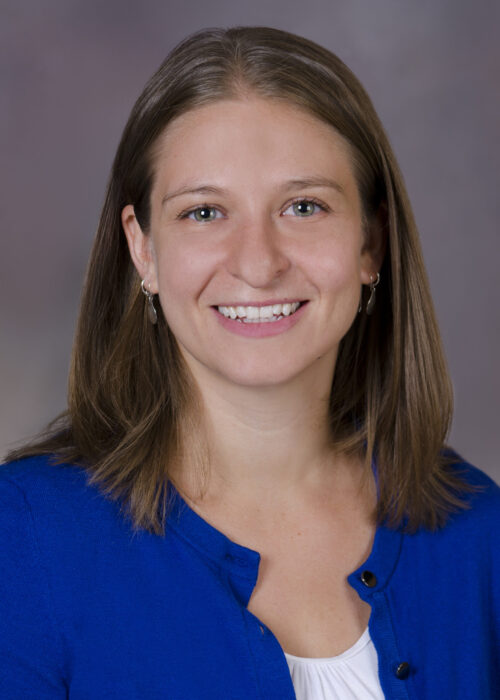Purdue researcher offers insights into common ADHD myths
Written By: Rebecca Hoffa, rhoffa@purdue.edu

Sarah Karalunas, assistant professor of psychological sciencesPhoto provided
Because ADHD can look different for different people, many misconceptions have circulated about the neurodevelopmental disorder. In her research, Sarah Karalunas, assistant professor of psychological sciences in the Purdue University College of Health and Human Sciences, aims to lend better understanding of attention-deficit/hyperactivity disorder, or ADHD, and neurodevelopmental disorders in children to improve assessment and treatment.
In recognition of ADHD Awareness Month, Karalunas shared her findings and go-to resources to help people become more aware of the truths of ADHD and the challenges it can cause.
What are some myths about ADHD?
I feel like a lot of times, you get more moralistic-bent myths — like these are bad kids or this is bad parenting — or that it’s not real. I think if you’ve never parented or worked with a kid who has differences in the way their brain works or the way they behave, it’s easy to think it could all be solved with parenting. With ADHD, it looks so different for different kids. Some kids are running around and wild. Some kids are zoned out in the back of the room. Because of that, it can be hard to pin down. It’s not that people with ADHD aren’t trying hard enough, but it’s that some things — particularly the things that our society looks for, like doing well in school or sitting quietly at your desk for six hours — are harder for individuals with that diagnosis. I think what gets lost is the different contexts. We can help people with ADHD succeed in our existing world, and we can think about how we can make changes in schools and workplaces to support them better.
What causes ADHD?
We don’t totally know. We think there’s a pretty substantial genetic component. Yet, lots of people who have family members with ADHD don’t end up with a diagnosis, and lots of people end up with a diagnosis without family history. So, there’s obviously other things going on. Some of my collaborators are interested in early prenatal influences on development or exposure to toxins like lead. All of those things probably interact, and the cause is probably different for different kids, which is why it ends up being difficult to tease apart.
What are the symptoms of ADHD?
The classic ones are things like having trouble sitting still, fidgeting, acting without thinking — those are all hyperactivity and impulsivity symptoms. Lots of kids experience inattention, which can look like difficulty paying attention for a long time or making careless mistakes. These sound like things we all do all the time, so really, we’re looking for these things happening much more often than for other people of the same age, and they’re getting in the way of succeeding or achieving goals. So, if I make a lot of mistakes, but I catch them myself, and I fix them, and I never get a bad grade, we don’t call that ADHD.
What are some of the challenges that ADHD can create in someone’s life?
It can vary so much by person, so not everyone will experience these challenges, but things like poor grades and frustration around that because you can’t show that you know the information on a test due to careless mistakes or inability to pay attention. There can be problems in social relationships if your friends are getting annoyed because you zone out when they’re trying to tell you something or if you act impulsively and say things that hurt their feelings, even though you don’t mean to. We also know that people with ADHD are at more risk for things like depression and anxiety, maybe partly because of other challenges they experience.
What options are available for diagnosis and treatment?
The best thing is to seek out an evaluation. A lot of families start with their pediatrician, and that can be a good place to raise concerns. They can also look for a psychologist or talk to their school. I would say the key thing if families seek out an assessment is to make sure it is soliciting input from the parents, the teachers and the kid themselves. If a college student has a question, they can go to their primary care doctor or a psychologist. The diagnosis in that age group is a little trickier. We do think ADHD emerges in childhood. So if a student is midway through college, and they start having problems paying attention or start feeling really fidgety, and they never felt that way before, that’s one of the things that needs to be assessed because there could be other things going on, such as anxiety, depression or general stress.
Medications can be a really good treatment for ADHD, and the evidence shows they prevent long-term bad outcomes. Some people get nervous to seek a diagnosis because they think their kid is just going to be placed on medicine. There are other non-medication treatments for kids with ADHD too, such as working with parents to teach specific skills to help their kid adjust and learn. There’s also organizational skills training, which is really great for teens and college students to learn organizational skills and ways to aid attention.
What resources are available to help people become more informed about ADHD?
The National Institute of Mental Health has a great ADHD Awareness series. They have fact pages, but they also do these really great videos that offer really nice perspectives from people who actually have that diagnosis. There’s also an organization called CHADD (Children and Adults with Attention-Deficit/Hyperactivity Disorder), which offers science-based resources for people with the diagnosis and teachers. There’s also a great book called “Getting Ahead of ADHD” by Joel Nigg that offers science-based information about where we are now in understanding ADHD.